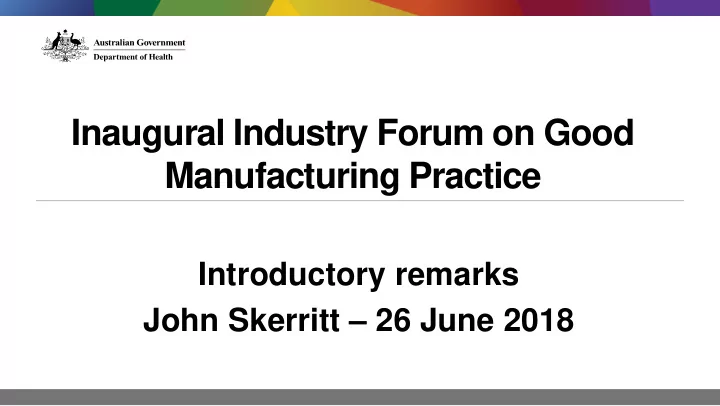

Inaugural Industry Forum on Good Manufacturing Practice Introductory remarks John Skerritt – 26 June 2018
This presentation GMP is often seen as an “enabling function” but there was overwhelming interest in this meeting! • Medicine and Medical Devices Review implementation • SME Assist • Other reforms to inspections and clearances • Medicinal cannabis products • International cooperation in brief 1
Medicines and Medical Devices Regulation Review • The most extensive changes to TGA regulation in a generation • Legislative changes in place, most business changes implemented • Many reforms affect demand for/ timeframes for GMP: § Priority review § Provisional approvals § Comparable Overseas regulator approvals § Low-risk therapeutic goods § Sunscreen reforms 2
SME Assist • Phone/ email support • Training workshops • SME-specific guidance documents • Interactive decision trees • Subscription services/ targeting • Signposting to other services e.g. international regulators, funding and business support, facility access, reimbursement 3
Other reforms: progress • Risk-based approach to inspection frequency , re-inspection frequencies and different product types introduced for medicines and blood, tissue and cellular therapies • Increasing industry education and stakeholder engagement • TGA-Industry technical working groups to finalise GMP guidances • Streamlining of internal business processes for GMP clearances and compliance verification 4
Work in progress • Sunscreens - aligning oversight to risk - PICS interpretation, other inspection options, ingredient requirements • Joint inspections with other regulators § Unclear what the implications of publication of inspections findings ands conditions e.g. by Canada will be • Fuller reliance on other countries for clearances/ compliance verification 5
GMP fees and charges • Changes to fees and charges for Australian and overseas inspections from July 2018 • Lower fees for lower risk products/ more compliant manufacturers • In order to reduce impact on industry, increases in GMP clearance application / compliance verification fees will be implemented from July 2019 • A fairer charging scheme - but we will under-recover actual costs until July 2019 6
GMP application to medicinal cannabis APIs Type of The Code of GMP (Part II) manufacturing is applied to processes shown in bold API extracted Collection of Cutting/initial Introduce the Isolate and Process plants extraction(s) purify and pack API starting (plant) material Herbal extracts Collection of Cutting/initial Further Process plants extraction(s) extract and pack (used as API) API powdered Collection of Cutting and Process commuting and pack herbs plants and/or cultivation and harvesting 7
In Australia, international regulatory cooperation is also official Government policy “ if a sy “ syst stem, ser service e or p product h has s been been appro roved u under r a trusted i interna nationa nal stand ndard or r ri risk a assessment, t the hen o n our re ur regulators sho hould no not impose an any ad y additional al r requirements f for ap approval in n Aus ustralia, unl , unless i it can n be demonstrated t tha hat there i is a goo ood r reason t to o do o so” o”. Prime Minister’s media release 14 October 2014
International Coalition of Medicines Regulatory Authorities Policy dialogue at agency head level ( 23 countries, EMA, EU and WHO) Initial projects completed: • Generic medicines information sharing processes • Documentation of capacity building initiatives • Establishment of systems to support GMP Inspection reports from one regulator to be recognised by other regulators – now PIC/S process Projects underway • Pharmacovigilance – big data, enhancing HCP reporting, vaccines • Supply chain security and crisis management • Innovation and horizon scanning – new regulatory pathways
Implementation of work sharing on evaluating new medicines • Common template and safety assessment of 10 complementary medicine ingredients, starting cooperation on efficacy/claims • First work sharing trial for a generic medicine completed, along with convergence of technical requirements e.g. bioequivalence • Work sharing on New Chemical Entity submissions underway, biosimilars cooperation being considered • Synchronising submissions by industry to different countries is hard • Secure portal for confidential information exchange developed
Pharmaceutical Inspection Convention/Co-operation Scheme • Development and maintenance of harmonised GMP standards and quality systems for medicines inspectorates • Use of GMP clearances based on reports from recent inspection by other regulators reduces the number of TGA overseas inspections required by 90% • Need to further develop process to see what third country inspections we can recognise and obtain GMP inspection plans
Conclusions • Manufacturing quality is a central part of TGA’s regulatory system • So impacts on GMP processes and demand need to be closely considered in implementing reforms to medicines regulation • Further business improvements underway • International regulatory collaboration will provide benefits for • industry – faster market access, lower costs • earlier patient access to medicines • regulators – reduced workload, less duplication • Can make even greater use of inspections done by other regulators (but Australia has to contribute to the global inspection effort!) • Stronger communication and partnering with industry will be critical
Recommend
More recommend